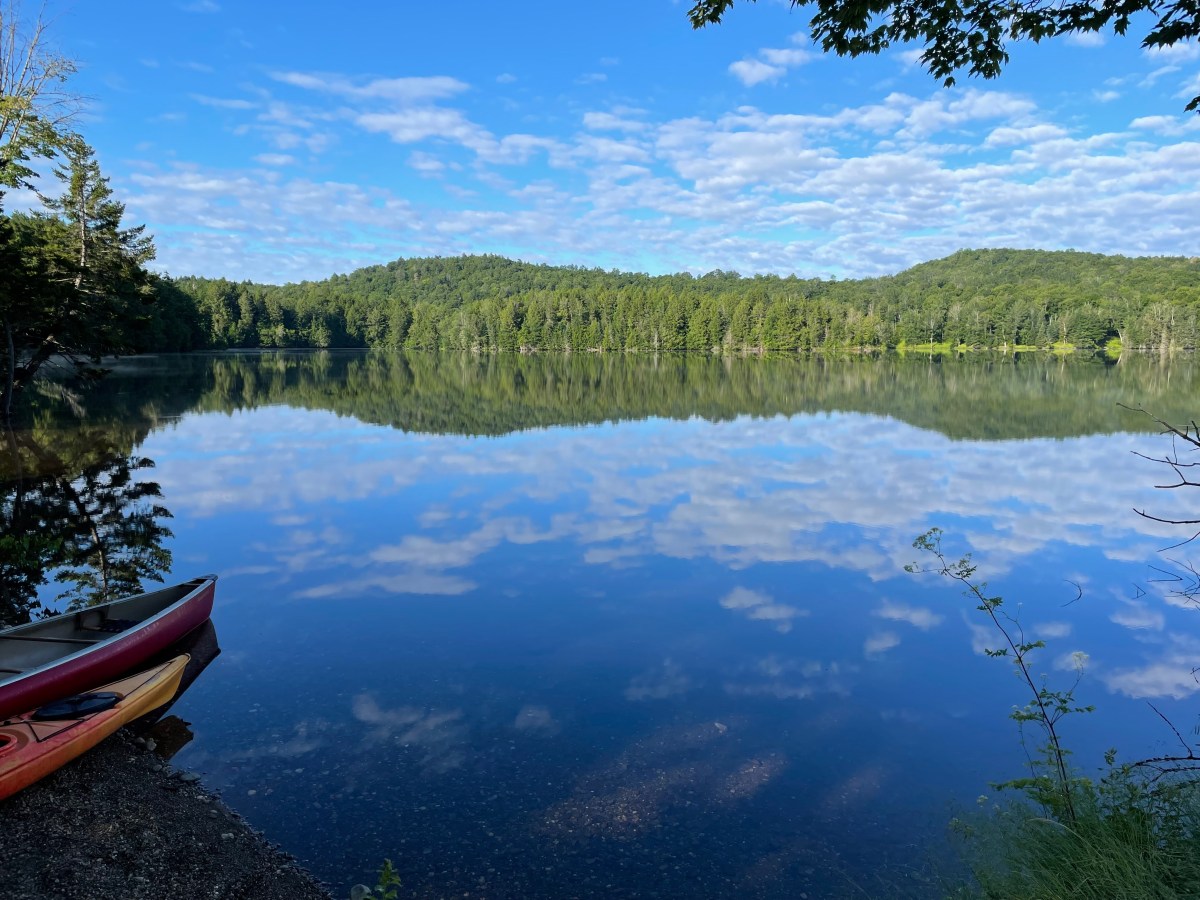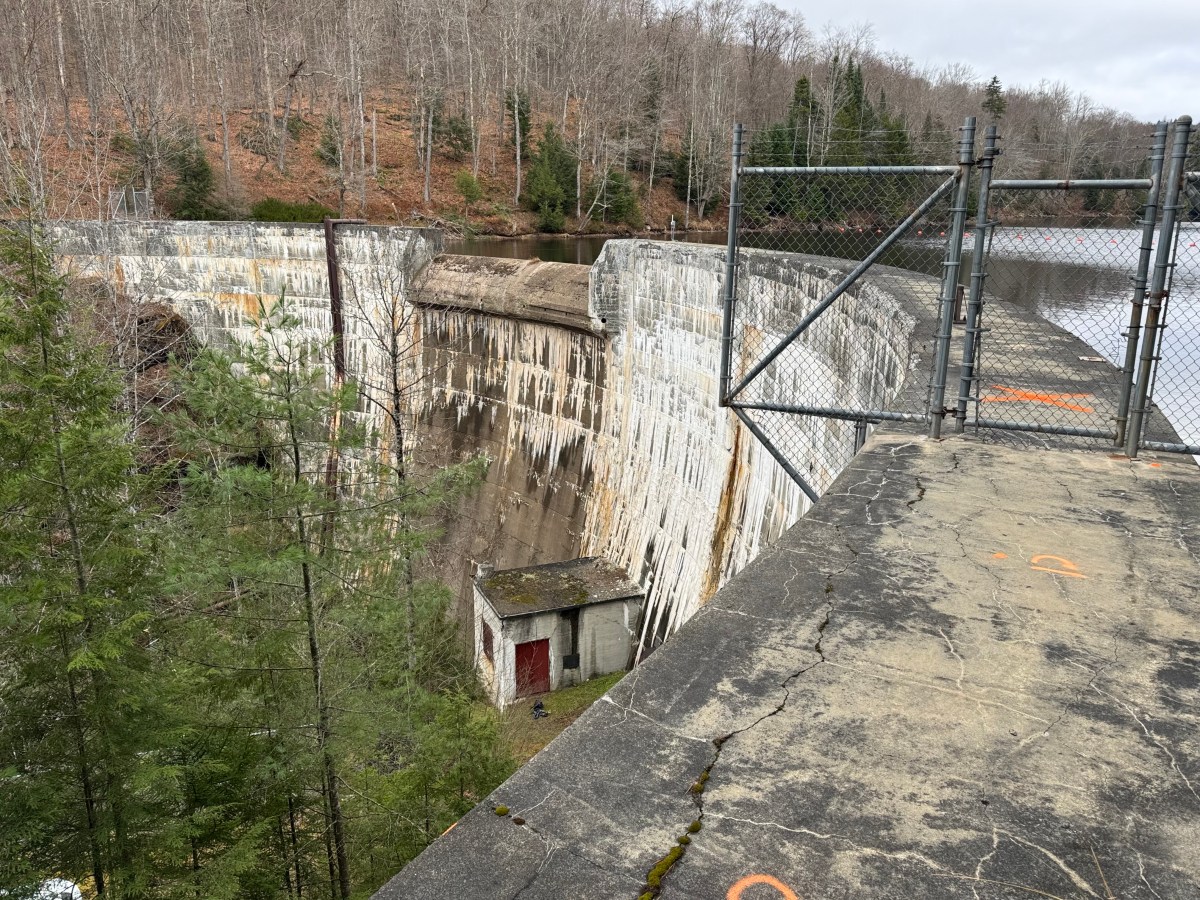
The Green River Reservoir in Hyde Park has long offered a true wilderness experience, with its undeveloped shorelines and remote campsites reachable only by paddling. But after years of back and forth between state officials and the owners of the dam that creates the reservoir, the future of this site still looks uncertain.
Before the state could consider acquiring the facility, it needed a comprehensive picture of the conditions of the Green River Dam and dike and the operational and maintenance costs. A long-awaited study commissioned by lawmakers provided those answers when it was released two weeks ago.
The hydro facility was built in 1947, which raised concerns about whether it would need expensive structural updates. The report finds that the hydro facility is largely safe and performs well and provides estimates for the initial project costs and annual maintenance costs.
But Gov. Phil Scott made clear last week during a press conference that the state doesn’t have the resources to take over the dam.
The Green River Reservoir’s dam is owned and operated by Morrisville Water & Light, but the utility has been seeking a new owner for the dam, saying they can no longer make a profit operating the facility. The utility argues the state should take it because the state benefits when people visit the Green River Reservoir State Park.
In 2010, Morrisville Water & Light started the process of relicensing the dam with the Federal Energy Regulatory Commission, a step required every few decades. During that process, the Vermont Agency of Natural Resources issued new water quality regulations, which establish how the facility can be operated to align with the federal Clean Water Act.
Morrisville Water & Light claimed that operating the facility under the new permit would limit their power generation capabilities, as the water level in the reservoir would need to be roughly stable, impacting the utility’s ability to do drawdowns and resulting in financial loss. After years of litigation, a Vermont Supreme Court decision ultimately determined the regulations were necessary to meet Vermont water quality standards.

Scott Johnstone, general manager of Morrisville Water & Light, said the utility would no longer be able to operate the hydro facility if it’s not producing revenue through power generation, and it has been exploring options to sell the facility, but no other company has been interested in buying it, for the same reason.
The recent legislative report also states that generating power at the facility with the new water quality permit would result in financial loss.
However, Jon Groveman, policy and water program director of the Vermont Natural Resources Council, took issue with that finding. “There’s no analysis that I was able to see,” he said. “Maybe that’s accurate, maybe it’s not.”
“But even if that is correct,” Groveman added, “it doesn’t change what’s needed to meet the minimum water quality standards.” Groveman emphasized the importance of these standards in maintaining healthy waters and fish habitats.
Julie Moore, secretary of the Vermont Agency of Natural Resources, said some hydropower facilities have experienced a reduction in maximum power production, but not to the extent that they wouldn’t be able to generate power without a financial loss. “This is the only instance my staff are aware of where our regulatory framework produced a result that effectively would not allow power generation to continue, at least not cost effectively,” she said.
But Johnstone said there are two reasons the Green River Dam situation may differ from the others. “The Green River Dam was built to fluctuate and draw down water as all reservoir-based dams do, and essentially the state is no longer supportive of that sort of flow regime even where there’s a reservoir,” he said.
Johnstone added that there are a few other dams in the state that rely on drawdowns from reservoirs, but most of them have bigger rivers flowing into them, whereas the Green River Dam relies mostly on the reservoir because it doesn’t have a significant daily flow.
Secondly, the relicensing process may occur at different times for different facilities, and according to Johnstone, the regulations become stricter as the years pass, and some facilities could have different permits.
According to the study, the most cost-effective option would be to maintain the dam and dike to preserve the reservoir but decommission the hydroelectric facility and cease producing power. In that scenario, the report estimates, the reservoir would generate $32.7 million in visitor spending and $1.5 million in state sales tax revenue over the next 20 years.
Yet Moore highlighted that the facility is particularly complex to operate, so taking ownership of it would be a significant obligation for the state. “We already are responsible for 100 dams; many of which have costly maintenance needs that we are struggling to keep up with,” she said.
Gov. Scott said during last week’s press conference that he was willing to collaborate with the parties involved to find a solution. But what that solution could look like is still unclear.
“We’re not fighting about the permit anymore. We’ve kind of given up on that,” Johnstone said. Morrisville Water & Light is still following the old regulations, but when federal regulators issue a new license, the utility will have to comply with the new water quality permit.
In the meantime, the utility has started the process to receive federal approval to stop producing power at the Green River Dam.
“We’re going to take care of the facility during this, what we hope is a transition period, but our view is that if we are not going to generate power at that facility anymore, then the use of the dam that is left is to support the state park,” Johnstone said. “So our position is that the state of Vermont should now own that dam because it supports that state park.”
The process of transition could take years, so nothing is expected to change at the Green River Reservoir in the immediate future, but now that the legislative report has been released, the ownership of the dam is likely to become a topic of discussion in the next legislative session.


